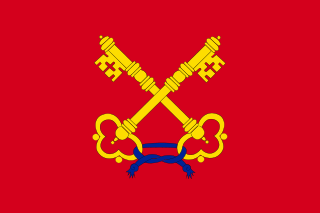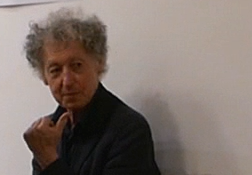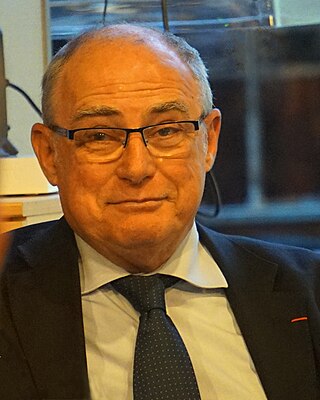
Provençal is a variety of Occitan, spoken by people in Provence and parts of Drôme and Gard. The term Provençal used to refer to the entire Occitan language, but more recently it has referred only to the variety of Occitan spoken in Provence. However, it can still be found being used to refer to Occitan as a whole, e.g. Merriam-Webster states that it can be used to refer to general Occitan, though this is going out of use.

The Comtat Venaissin, often called the Comtat for short, was a part of the Papal States from 1274 to 1791, in what is now the Provence-Alpes-Côte d'Azur region of Southern France.

Albert Memmi was a French-Tunisian writer and essayist of Tunisian Jewish origins. A prominent intellectual, his nonfiction books and novels explored his complex identity as an anti-imperialist, Zionist, and self-described "Jewish Arab."
Judeo-Provençal, Judæo-Occitan or Judæo-Comtadin, are the names given to the varieties of Occitan or Provençal languages historically spoken and/or written by Jews in the South of France, and more specifically in the Comtat Venaissin area.
Judaeo-Romance languages are Jewish languages derived from Romance languages, spoken by various Jewish communities originating in regions where Romance languages predominate, and altered to such an extent to gain recognition as languages in their own right. The status of many Judaeo-Romance languages is controversial as, despite manuscripts preserving transcriptions of Romance languages using the Hebrew alphabet, there is often little-to-no evidence that these "dialects" were actually spoken by Jews living in the various European nations.

Shmuel Trigano is a sociologist, philosopher, professor emeritus of sociology at Paris Nanterre University. He was Tikvah Fund Visiting Professor in Jewish Law and Thought at Benjamin N. Cardozo School of Law, New York (2009), and Templeton Fellow at the Herzl Institute (Jerusalem) program "Philosophy of the Tanakh, Midrash and Talmud" (2012-2013), (2015-2017). Elia Benamozegh European Chair of Sephardic Studies, Livorno, Italy (2002).
Hachmei Provence refers to the hekhamim, "sages" or "rabbis," of Provence, now Occitania in France, which was a great center for Rabbinical Jewish scholarship in the times of the Tosafists. The singular form is hakham is a Sephardic and Hachmei Provençal term for a rabbi.

Henry Laurens is a French historian and author of several histories and studies about the Arab-Muslim world. He is Professor and Chair of History of the Contemporary Arab world at the Collège de France, Paris.

Jean Hugo was a painter, illustrator, theatre designer and author. He was born in Paris and died in his home at the Mas de Fourques, near Lunel, France. Brought up in a lively artistic environment, he began teaching himself drawing and painting and wrote essays and poetry from a very early age. His artistic career spans the 20th century, from his early sketches of the First World War, through the creative ferment of the Parisian interwar years, and up to his death in 1984. He was part of a number of artistic circles that included Jean Cocteau, Raymond Radiguet, Pablo Picasso, Georges Auric, Erik Satie, Blaise Cendrars, Marie-Laure de Noailles, Paul Eluard, Francis Poulenc, Charles Dullin, Louis Jouvet, Colette, Marcel Proust, Jacques Maritain, Max Jacob, Carl Theodor Dreyer, Marie Bell, Louise de Vilmorin, Cecil Beaton and many others.
The Prix Guizot is an annual prize of the Académie Française, which has been awarded in the field of history since 1994 by Fondations Guizot, Chodron de Courcel, Yvan Loiseau and Eugène Piccard.
La Chartreuse de Parme is a four-act opera in eleven tableaux by Henri Sauguet with a French libretto by Armand Lunel after the 1839 novel of the same name by Stendhal. The composer's third opera, and his first on a serious subject, it was first performed at the Paris Opera in 1939 but has not entered the repertoire.

Pierre Birnbaum is a French historian and sociologist.

Maurice Sartre is a French historian, an Emeritus professor of ancient history at the François Rabelais University, a specialist in ancient Greek and Eastern Roman history, especially the Hellenized Middle East, from Alexander to Islamic conquests.

Esther Benbassa is a French-Turkish-Israeli historian and politician. She specializes in the history of Jews and other minorities. Since 2011, Benbassa has served as a French senator, representing Paris from 2017 onwards and Val-de-Marne from 2011 to 2017.

Georges Bensoussan is a French historian. Bensoussan was born in Morocco. He is the editor of the Revue d'histoire de la Shoah. He won the Memory of the Shoah Prize from the Jacob Buchman Foundation in 2008.

Jean-Christophe Attias is a French historian and scholar. He was born to an Algerian Jewish father and a Catholic mother from the Charente.
Mardochée Venture was a French Judaic scholar and translator. He served as secretary and Hebrew interpreter at the Library of King Louis XVI.
Judeo-Gascon is a sociolect of the Gascon language, formerly spoken among the Spanish and Portuguese Jews who settled during the 16th century in the cities of Bordeaux, Bayonne and in the south-west part of Landes of Gascony (most notably in Peyrehorade and Bidache. Judeo-Gascon, as Judeo-Provençal, the other major Jewish sociolect of Occitan, is now practically extinct.
This list of antisemitic publications in France chronologically gathers writings considered or claimed to be antisemitic, produced by French-speaking authors, whether writers or journalists, and published in French territory from the early 19th century to the present day. It should be viewed in the context of the history of antisemitism, a complex history that has been extensively studied since the 1960s.











